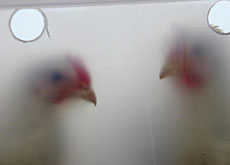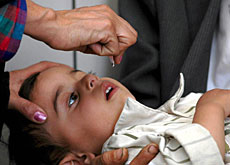Swiss take further action over bird flu

Switzerland is extending a ban on birds and poultry from Asian countries to Russia and Kazakhstan in a bid to prevent the spread of avian flu.
At the same time, the Federal Health Office says it wants to build a reserve of vaccine to protect up to 100,000 people should the flu begin passing to humans.
Bern is following European Union policy in extending its import ban, even if the measure is purely a formality.
The Federal Veterinary Office said in a statement on Friday that Switzerland does not import any birds or poultry from Russia or Kazakhstan that could introduce the virus into the country.
It also reminded travellers not to illegally bring back into Switzerland products including eggs, meat, non-treated feathers or birds from the 13 countries now on a list affected by the import ban.
Russian and Kazakh authorities last week admitted that avian flu had been discovered in several regions.
Migratory birds
The Russian authorities have said that migratory birds from southeast Asia could have brought the virus with them as they flew to Siberia for the summer.
A panel of Swiss government experts on Tuesday said the risk of the bird flu being brought into Switzerland was low.
And the Federal Health Office added on Friday that there was at present no risk to the Swiss population.
But the office reported it had launched a tender on Friday to buy enough vaccine to protect 100,000 people against the deadly H5N1 virus.
The office said it was a precautionary measure in case of an increase in the number of incidents of the flu passing from birds to humans.
Ornithologists
Matthias Kestenholz from the Swiss Institute of Ornithology told swissinfo earlier this week that if it was confirmed that the H5N1 strain was responsible for the outbreaks in Russia and Kazakhstan, the disease was then theoretically a step closer to arriving in Switzerland.
“There are two types of migratory water birds which fly from Siberia to Switzerland for the winter: the pochard and the tufted duck,” said Kestenholz.
However, Kestenholz said that it was highly unlikely that these birds would be infected when landing on Swiss shores, given the aggressive nature of the disease.
“If they were sick when they left Siberia, it is highly unlikely they would be fit enough to fly nearly 4,000 kilometres to Switzerland,” Kestenholz said.
Earlier this week, the Geneva-based World Health Organization (WHO) announced that it was engaged in talks with Swiss pharmaceutical firm Roche about building a stockpile of the anti-bird flu drug Tamiflu.
WHO Director-General Lee Jong-woo said the intention was to create a reserve of at least one million doses. The WHO currently has 125,000 doses at its disposal.
swissinfo with agencies
The 13 countries affected by the import ban are Thailand, Cambodia, Indonesia, Laos, Vietnam, North Korea, Pakistan, Malaysia, China, Russia and Kazakhstan.
Imports have also been suspended from South Africa and Canada but as a result of a different virus strain.
The H5N1 strain of avian flu has caused the deaths of at least 50 people in southeast Asia infected by coming into contact with sick birds.
Cases have also been reported in Russia and Kazakhstan but it has not yet been confirmed that these also involve the H5N1 strain.

In compliance with the JTI standards
More: SWI swissinfo.ch certified by the Journalism Trust Initiative










You can find an overview of ongoing debates with our journalists here . Please join us!
If you want to start a conversation about a topic raised in this article or want to report factual errors, email us at english@swissinfo.ch.